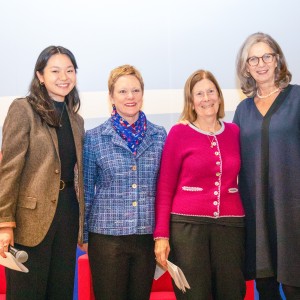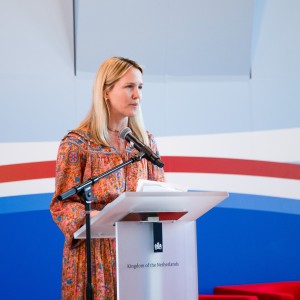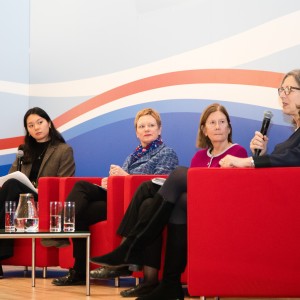Shaping Tomorrow’s World with Feminist Foreign Policy
On February 7, 2024, Meridian International Center, in partnership with the Embassy of the Kingdom of the Netherlands and Women’s Foreign Policy Group, hosted an engaging discussion sparked by "Feminist Foreign Policy in Theory and in Practice”, written by Stephenie Foster and Susan Markham. Ambassador Birgitta Tazelaar of the Kingdom of the Netherlands also joined the conversation to discuss how her country implements Feminist Foreign Policy. The conversation explored how feminist perspectives transform foreign policy, exceeding conventional conflict resolution to promote gender equality and empower women's leadership in security.
Stephenie Foster and Susan Markham’s perspectives provide the fundamental principles shaping the creation and execution of feminist foreign policy. These principles include the acknowledgment of gender equality as both an objective and a strategy, expanding the definition of security, the elevation of diverse voices, and a commitment to resolving historical power disparities. Ambassador Tazelaar was able to provide insights into her experience with Feminist Foreign Policy and how Dutch foreign policymakers continue to make developments. The event concluded with a reception, offering guests an opportunity to further engage in these crucial conversations surrounding our shared global challenges of power, security, and gender.
Top Takeaways from the Program:
Feminist Foreign Policy has 4 principles
Many have never heard of Feminist Foreign Policy (FFP) or understand how it manifests in policy. There is no straightforward definition of FFP as each country has applied it in different ways. During the panel, the discussion clarified the four key principles of FFP that serve as the baseline for policymakers. First, gender equality must be understood as a goal and strategy. The second calls for a broadened security policy. Third, FFP calls for the elevation of diverse voices. Finally, FFP addresses historic power imbalances that prevent progress.
Feminist Foreign Policy around the World
The first country to adopt FFP was Sweden in 2014. Since then, 15 countries have followed Sweden’s example. FFP has been adopted by developed and developing countries alike, demonstrating the vast potential of the policy. Since adopting FFP in May 2022, the Netherlands has created task forces to develop FFP, created online tools and events to educate on FFP, and elevated female role models to become future feminist foreign policymakers.
Does the U.S. have a Feminist Foreign Policy?
Although the U.S. has not officially adopted FFP, there is a greater gender focus in current U.S. policy. It’s important to remember that “domestic policy is foreign policy,” so concentrating on gender domestically can help the U.S. strengthen its foreign policy. With greater accountability, inclusion, and gender analysis within the government, the U.S. can create more effective and sustainable domestic and foreign policies.
Feminism is not men versus women
To be for gender equality is to be a feminist. The word “feminist” has become taboo, making it difficult for FFP to be accepted by global leaders. For example, Sweden rescinded FFP in 2022 because the word “feminist” had become too divisive. Gender inequality affects both men and women and it’s important to address these issues together. The goal of FFP is to address these imbalances and find ways to uplift both men and women.
Feminist Foreign Policy reimagines the potential of security
It is integral that policymakers understand the full role of women in peace, security, and conflict and uplift their voices at the negotiating table. By looking at security more holistically, foreign policymakers can better understand how to protect their country and others. FFP looks at the many ways that security can be affected, and gender analyses help create a clearer picture on how best to move forward.
Civil Society is key to Feminist Foreign Policy
To reap all the benefits of FFP, countries rely on civil society to press policymakers for better policy. Through education and elevating diverse voices, civil society creates pressure from the outside to create change on the inside. By working with men and women, encouraging transparency, speaking truth to power, and listening to diverse voices, civil society can make FFP a reality.
Personnel is policy
Civil society is a powerful tool as “personnel is policy.” Institutions are difficult to change, so it is finding people willing to push them. Decision makers need to be more representative of their societies and FFP addresses this disparity. With the help of civil societies, FFP can uplift diverse voices and transform foreign policy.
Project summary
| Shaping Tomorrow’s World with Feminist Foreign Policy | February 2024 | |
|---|---|
| Number of Attendees: | 100 |
| Impact Areas: | Empowering Women and Girls, Foreign Policy |
| Partners: | Individuals/Donors, Public Sector |



